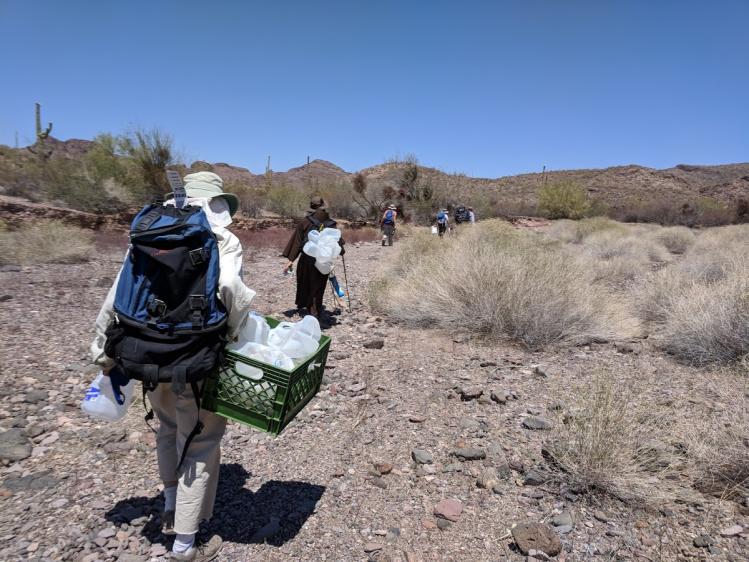
On July 2, federal prosecutors announced that they would retry Scott Warren, an activist with the Arizona-based humanitarian group No More Deaths (NMD), after a hung jury failed to convict him on charges of conspiracy and harboring migrants in the United States illegally. Warren’s case first made headlines in January 2018 when he and seven other activists were charged with trespassing and littering in the course of their humanitarian work—providing stores of food, water, and other supplies along the treacherous desert routes through which migrants enter the United States, as well as recovering and helping to identify the bodies of those who die on the journey.
To activists and volunteers at the border, cases brought against humanitarian workers amount to a strategy of harassment by government and law enforcement to deter them from their work. The legal conflation of giving basic aid—in the charges brought against Warren, providing “food, water, clean clothes and beds”—with “harboring” migrants has been used to threaten other activists besides Warren with felony charges. NMD activists were targeted for observation by Border Patrol and federal officials in April 2017, the same month that then-Attorney General Jeff Sessions traveled to the Arizona border to order the prosecution of additional harboring and smuggling cases. At the same time, officials began criminalizing aspects of the activists’ work—driving on roads or leaving “personal property” (specifically, water containers, food, blankets, and medical supplies) on federal land, and even going so far as to ban NMD activists from the wildlife refuge through which migrants were traveling—and where activists have located some of the 3,000 bodies that have been found throughout Pima County, Arizona, since 2000.
The case of Warren and NMD is just one instance in the broader trend. The same day that Warren’s retrial was announced, Amnesty International featured his case in a report detailing harassment of activists, humanitarian-aid workers, lawyers, and journalists along the southern border—including threats and intimidation as well as illegal surveillance, searches, and detention.
Arguably, NMD and groups like it are providing a public service—recovering the remains of those who have died, working with law enforcement to identify them, and using private donations to reduce the deadliness of the desert journey. So why is the government doing everything it can to prevent their work?
In short, the cruelty is the point. A strategy of “prevention through deterrence”—making crossing the border so perilous and grueling that people will choose not to attempt it—has dominated U.S. policy toward migration and the border for decades. (The same rationale lurked beneath the Obama administration’s buildup of detention centers and the Trump administration’s practice of separating children from their parents.) In the mid-1990s, after observing that migrants entered illegally most often in cities, Border Patrol and the Pentagon began to build up security in major ports of entry. Knowing this would force someone attempting to enter the United States to take a far more dangerous route through the desert, government officials believed that this would deter migration. Instead, it increased migrant deaths. In Pima County, where No More Deaths is based, the number of dead jumped from about twelve per year in the 1990s to 155 per year after the policy was implemented. Those numbers reflect only remains that were found and catalogued; the true number of dead is very likely higher.
For a brief time after these policies were established, NMD worked in conjunction with Border Patrol, informing them of aid drops and coordinating searches for missing persons. But the relationship soon changed. In January 2018, the group released a report cataloging instances of Border Patrol gleefully destroying water containers placed along migration routes, effectively condemning people to die of thirst and exposure; the report also cited cases of officers harassing volunteers as they deposited supplies and searched for bodies. Border Patrol officials deny the accusations, but it is clear that they were nervous about them: internal emails and text messages suggest that the report spurred the agency to target Warren quickly. He was arrested just hours after its release.
In an op-ed for the Washington Post during his first trial, Warren considered the implications of the case brought against him. As the government expands its definitions of “transportation” and “harboring” of people in the country illegally, a conviction in his case (or, as is now possible, in his retrial) would set a “dangerous precedent.” What would these new definitions mean for Americans living with relatives of illegal status? Would it include sharing an apartment? Transporting them in a car? The mere knowledge of a person’s whereabouts without reporting them?
Who is an alien? Who is my neighbor? Warren’s answer is clear: “Whatever happens with my trial, the next day, someone will walk in from the desert and knock on someone’s door…. If they are thirsty, we will offer them water; we will not ask for documents beforehand.”

